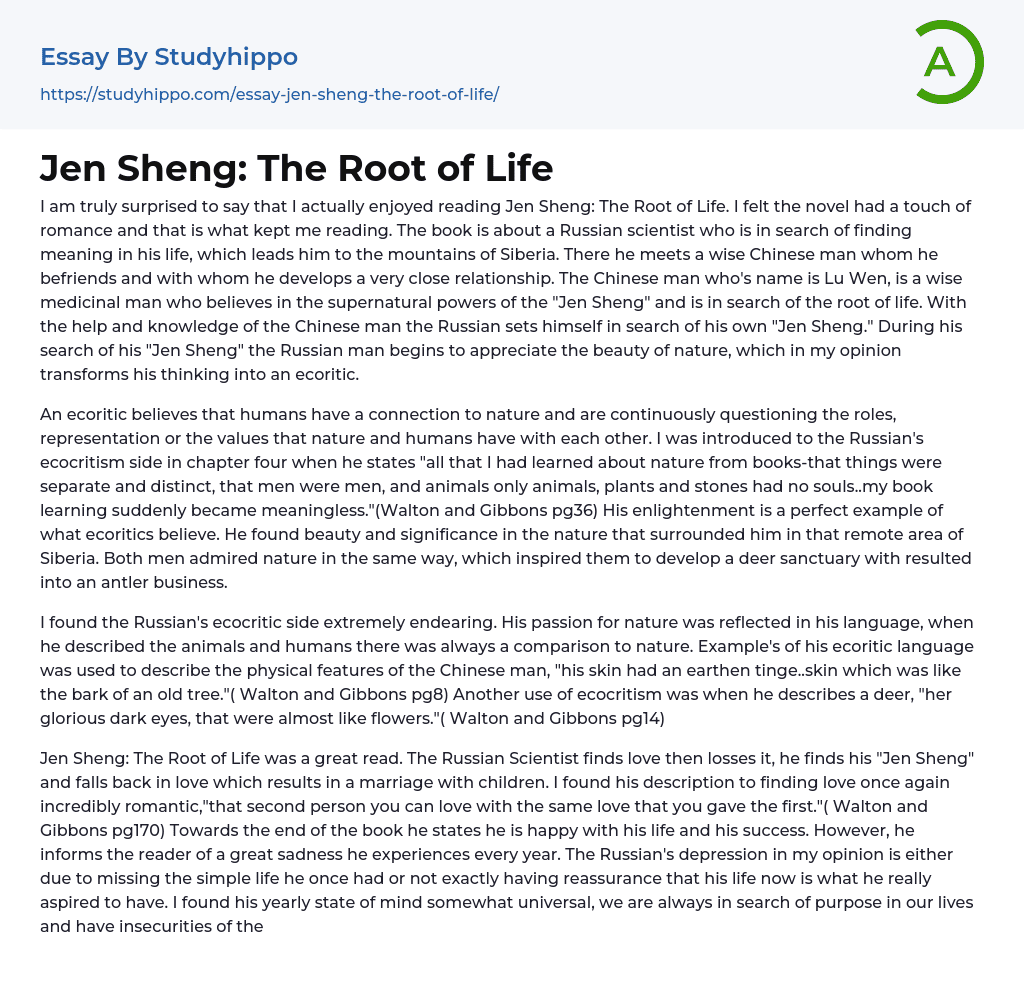Reading Jen Sheng: The Root of Life was a pleasant surprise for me. The novel kept me engaged with its romantic undertones. It follows the journey of a Russian scientist in search of meaning, leading him to the Siberian mountains. There, he forms a close bond with Lu Wen, a wise Chinese man. Lu Wen is an herbalist who believes in the supernatural powers of "Jen Sheng" and is on a quest to uncover the root of life. With Lu Wen's guidance, the Russian man embarks on his own search for his personal "Jen Sheng." Along the way, he develops a newfound appreciation for nature and undergoes a shift in perspective towards environmental consciousness.
A belief shared by ecocritics is that humans have a connection to nature and are constantly contemplating the relationships, portrayal, and values associated with nature and huma
...ns. In chapter four, I encountered the perspective of a Russian ecocritic who revealed that his previous understanding of nature from literature, which depicted separate entities for humans, animals, plants, and inanimate objects without souls, suddenly lost its meaning. This realization perfectly exemplified the principles advocated by ecocritics. He discovered beauty and significance in the natural environment surrounding him in a remote area of Siberia. Both individuals admired nature in the same way, which motivated them to establish a deer sanctuary that eventually resulted in an antler business.
I found the Russian's ecocritical side to be very charming. His love for nature was evident in his words, as he always made comparisons to nature when describing animals and humans. An example of his use of ecocritical language was seen when describing
the physical features of the Chinese man, stating that "his skin had an earthen tinge... skin which was like the bark of an old tree" (Walton and Gibbons, pg8). Another instance of ecocriticism is seen when he describes a deer with "glorious dark eyes, that were almost like flowers" (Walton and Gibbons, pg14).
Jen Sheng: The Root of Life was an enjoyable book. The protagonist, a Russian Scientist, goes through the ups and downs of love, ultimately finding it again and getting married with children. I found his perspective on finding love once more to be very romantic, as he compares it to loving someone in the same way as before. Towards the end of the book, he expresses contentment with his life and achievements. However, he also reveals an annual sadness that he experiences. In my view, this could be attributed to either longing for the simpler life he once had or feeling uncertain about whether his current life aligns with his aspirations. I found this periodic state of mind to be relatable – the constant search for purpose in our lives and doubting the choices we have made.
- Family essays
- Wealth essays
- Punctuality essays
- Carpe diem essays
- Persistence essays
- Chicken essays
- Crops essays
- Object essays
- Adaptation essays
- Love Story essays
- Mystery essays
- Thank You essays
- Hero essays
- Farm essays
- Focus essays
- Development essays
- Welding essays
- Nursing essays
- Integrity essays
- Hypocrisy essays
- Mother Tongue essays
- Contrast essays
- Secret essays
- First Love essays
- Motherhood essays
- Beauty essays
- Alcohol essays
- Aging essays
- Narcissism essays
- Myself essays
- Greed essays
- Limitations essays
- Fire essays
- House essays
- Peel essays
- Evil essays
- Humility essays
- Perspective essays
- Dream essays
- Change essays
- Choices essays
- Toys essays
- Experience essays
- Wisdom essays
- Transport essays
- Barbie Doll essays
- Adversity essays
- Lifestyle essays
- Housing essays
- Holiday essays




